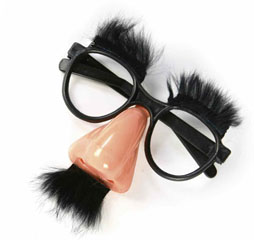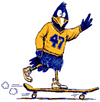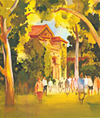 If you’re reading James Thurber and Robert Benchley and composing comedic poetry at the tender age of 7, then writing a book that examines humor from every conceivable angle doesn’t feel like that much of a stretch. Indeed, when David Misch ’72 began putting together Funny: The Book three years ago, it felt like the next logical step in a four-decade career that has included stints as a comedic folk singer, stand-up comedian and writer for such shows as Mork and Mindy and Saturday Night Live.
If you’re reading James Thurber and Robert Benchley and composing comedic poetry at the tender age of 7, then writing a book that examines humor from every conceivable angle doesn’t feel like that much of a stretch. Indeed, when David Misch ’72 began putting together Funny: The Book three years ago, it felt like the next logical step in a four-decade career that has included stints as a comedic folk singer, stand-up comedian and writer for such shows as Mork and Mindy and Saturday Night Live.
Misch credits his days at Pomona for both the beginning of his life’s work and its latest chapter. During his senior year, Misch was goofing around, making up songs on guitar with some friends in his Clark dorm room.Their laughter prompted a concert booking at the Smudge Pot coffee house and a postgraduate career as a “professional funny folk singer,” an occupation that, Misch notes, “went out around the same time as ‘buggy whip maker.’”
Misch adapted, though, writing for sitcoms, selling a handful of screenplays and serving as a special consultant on The Muppets Take Manhattan. When it came to time reinvent himself once again, Misch thought about teaching and remembered a multidisciplinary course he took during his senior year at Pomona titled Freud, Marx and Contemporary Literature. “I remember my mind being blown by the way the class brought all these things together,” Misch says. “So I got the idea to study comedy from every conceivable angle—science, biology, history, philosophy and psychology—and not just its manifestations in movies and television, as it’s usually studied.”
As Misch dove into the research, a literary agent friend told him he should fashion a book out of the material. Funny: The Book stands as the greatly abridged version of two years of study, as well as something of a companion to the course, Funny: A Survey of American Comedy, he taught last fall at the University of Southern California. In it, the witty Misch surveys the history of humor, considers the scientific nature of laughter and, amid a fart joke or two, makes a convincing case for comedy to be taken seriously.
“You’re up against it when you have people like Woody Allen saying that comedy is frivolous and inferior to drama,” Misch says. “But in my study, I was unable to discern any difference in the properties of comedy and drama, nor any difference in their complexity. The only difference: one produces laughter, the other tears.”
Misch blames the Greeks—Aristotle and Plato—for the persistent idea that laughter is cruel and immoral and thus somehow shameful. He trots out his own heavy hitters, citing Carl Jung’s belief that frivolity makes life worth living and functions as a crucial aspect of what makes us human. Misch also loves the notion propagated by author Philip Pullman that laughter ranks as one of life’s greatest pleasures, a simple delight that people can summon at will. And, of course, there’s Norman Cousins, who believed a daily dose of the Marx Brothers, along with a lot of Vitamin C, helped him live another 36 years after doctors diagnosed him with heart disease. Scientific studies of the correlation between humor and health aren’t conclusive, Misch says, but there does appear to be evidence that laughter does help a little. “And a little is better than nothing,” Misch says.
But what’s humorously healing to Misch might be a source of irritation to someone else. And vice versa. Misch didn’t need to endure the quizzical stares of some of his USC students or the occasional wave of head-scratching he noticed while teaching a course in musical satire last spring at UCLA to know that comedy is totally subjective. For him, that’s just another aspect of humor that elevates it above drama as an art form. “That subjectivity gives comedy a mystery that drama lacks,” Misch says. “What makes something funny? After all the scientific dissection I do, it’s still a little mysterious why one sentence is funny and why another sentence, that’s almost identical save for one word or sometimes one piece of punctuation, isn’t. To me, there’s magic in that mystery.”


